CERL Internship and Placement Grant
CERL INTERNSHIP and PLACEMENT GRANTS
Every year, CERL offers Internship and Placement Grants, to the value of 1,000 Euros each, to allow qualified librarians and scholars to work on CERL projects in CERL libraries, or in CERL offices, and to be trained on CERL databases, generally for a period of one month.
In particular, CERL is looking to support people new to the profession, whether in librarianship or in academia, and to facilitate international mobility.
CERL member libraries propose projects suitable to the CERL Grant. Internships are generally advertised in January and should normally take place within the period June-December.
CERL’s Grants Sub-Committee 2025- (Cristina Dondi, Anders Toftgaard, Maria Berggren)
CERL’s Grants Sub-Committee 2014-2024 (Cristina Dondi, Adrian Edwards, Anders Toftgaard)
RECIPIENTS OF 2025 GRANTS
The CERL Grant Committee is very pleased to announce the conferment of six CERL Grants:
1. To catalogue incunabula at the Huntington Library, San Marino California to Iván Pérez Marinas (Spain), a curator in the Department of Manuscripts, incunabula, and Rare Books of the National Library of Spain, Madrid.
2. To catalogue incunabula at the Aikaterini Laskaridis Foundation, Piraeus, Greece to Jemima Bennett (UK), a PhD student in Medieval and Early Modern Studies at the University of Kent and Bodleian Libraries Oxford (collaborative doctoral partnership).
3. To catalogue incunabula at the Museum Plantin-Moretus, Antwerp to Letizia Guzzetti (Italy), a student at the Vatican School of Library science.
4. To describe provenance marks at Royal Irish Academy, Dublin to Madeline Birnbaum (United States), Assistant Archivist at Boston University School of Theology Library.
5. To catalogue incunabula at Blickling Hall, Norfolk (National Trust) to Carmen Oanea (Romania), a PhD student at Babeș-Bolyai University in Romania exploring the reading practices and habits of early modern readers based on data obtained from former Jesuit libraries across Europe; and with experience in cataloguing Cluj incunabula in MEI.
6. To do research for CERL’s Secretariat (specifically, to explore the website of the European Union’s Horizon Europe Programme to identify suitable funding calls to support the work of CERL and of its member libraries) to Felix Vanden Borre (Belgium), an MPhil student in Digital Humanities at Trinity College Dublin.
We received 20 applications from Belgium (2); Brazil (2); France (1); Greece (1); Ireland (1); Italy (4); Romania (1); Slovenia (1, based in NL); Spain (2); Sweden (1); United Kingdom (3); United States (1). 11 early career scholars or librarianship students. 9 early career librarians/archivists or professionals. 15 female and 5 male applicants.
RECIPIENTS OF 2024 GRANTS
The CERL Grant Committee is very pleased to announce the conferment of six CERL Grants:
1.To catalogue incunabula at Gonville & Caius College, Cambridge to Seosamh Mac Cárthaigh, with a PhD in Anglo-Saxon Norse and Celtic and internships at the British Library and Dublin DIAS to Catalogue pre-1600 Irish manuscripts.
2. To catalogue incunabula at the Huntington Library, San Marino California to Jackson Hartigan, an MPhil student at Cambridge working on Lorenzo Pignoria’s De servis (1613) and student work experience at Williams College Chapin Library.
3. To work on map-inc (Mapping incunabula in Greek libraries) and CERL’s Provenance Digital Archive (PDA) at the Aikaterini Laskaridis Foundation, Piraeus, Greece to Tom Mackinnon, Library assistant at the National Portrait Gallery of London.
4. To describe provenance marks of the Fagel Collection, Library of Trinity College Dublin, in the Provenance Digital Archive (PDA) of CERL to Costanza Ficorella, Assistant Archivist, Office of Public Works, National Monuments Services, Dublin, with an MA in Archivistics, Diplomatics and Palaeography from the University of Ferrara and a MSt in Jewish Studies from the Univ. of Oxford.
5. To catalogue incunabula at the University Library of Naples to Valeria Cesaraccio, a PhD student in Renaissance Studies at the University of Warwick, working on education in 16th-century Italy, with an BA from the Univ. of Sassari and a MA from the Univ. of Turin.
6. To match incunable holdings with ISTC numbers at Utrecht University to Martina Uvale, with a Master’s degree in Library and Archival Sciences from the Univ. of Bologna, a period at the Universitat de València working on Aragonese manuscripts, an Erasmus at the Univ. Complutense of Madrid.
We received 14 applications from Greece (5, one based in the NL); Ireland (1); Italy (5, two based in the UK, one based in Ireland); Spain (1); United Kingdom (1); United States (1, based in the UK). 7 early career scholars or librarianship students. 7 early career librarians or professionals. 10 female and 4 male applicants.
RECIPIENTS OF 2023 GRANTS
The CERL Grant Committee is very pleased to announce the conferment of seven CERL Grants:
To catalogue in MEI the incunabula of Groningen University Library to Agnė Zemkajutė, Book Museum exhibitions’ curator, and formerly curator of incunabula, at the Wroblewski Library of the Lithuanian Academy of Sciences, Vilnius.
To catalogue in MEI the incunabula of the Huntington Library of San Marino Cal., to Isabel Hernandez Gomez de Caso, curator of manuscripts and incunabula, National Library of Spain, Madrid.
To work with the Incunabula Short Title Catalogue (ISTC) and Material Evidence in Incunabula (MEI), remotely, to Francesca Pontini, PhD student at Stirling University.
To work with the Incunabula Short Title Catalogue (ISTC) and Material Evidence in Incunabula (MEI), remotely, to Sheza Moledina, formerly Enssib, Printing Museum, and Public Library, Lyon.
To catalogue rare French printed ephemera, 1660-85, at Marsh's Library, Dublin, to Claire Castex, librarian at the Musėe du Domain Dėpartemental de Sceaux, Montrouge.
To work with CERL’s Retrospective National Bibliographies Working Group to Chana Algarvio, assistant librarian and programme coordinator in Book History and Print at the Robertson Davies Library, Massey College, University of Toronto, Canada.
To describe provenance marks in the Provenance Digital Archive of CERL at the Ossolineum Library, Wrocław, Poland, to Laura Kreigere-Liepina, formerly chief bibliographer and researcher at the Rare Books and Manuscripts collection, National Library of Latvia, Riga.
We regret to say that the grant to work on the CERL website was withdrawn: following our recent migration of data platform, in April 2023, it became clear that the CERL website needs a much bigger overhaul than foreseen. The work described in the CERL grant will now take place at a later date, as part of that work on the website.
We received 37 applications from Argentina (1), Canada (2), Czech Republic (1), Germany (3), France (3), India (1), Ireland (4), Italy (5), Latvia (1), Lithuania (1), Mexico (1), The Netherlands (5), Norway (1), Spain (2), UK (4), US (2). 22 early career scholars or librarianship students. 15 early career librarians. 14 male and 23 female applicants.
RECIPIENTS OF 2022 GRANTS
The CERL Grant Committee is very pleased to announce the conferment of six CERL Grants:
To catalogue in MEI the incunabula of Marsh's Library, Dublin, to Sara D’Amico, a cataloguer at the Biblioteca dell’Archivio Centrale dello Stato, Rome, with an Erasmus traineeship at the John Rylands Library in Manchester, and a MA in Library Science from “La Sapienza” University of Rome.
To catalogue in MEI incunabula from the collection of the Dukes of Arenberg, in Brussels, to Antonia Delle Fratte, an early career scholar with an internship at the Biblioteca Vallicelliana of Rome, and an MA in the History of Art (manuscript illumination and history of collections) from “La Sapienza” University of Rome.
To train in the use of MEI the incunabulists of the Biblioteca Nacional of Madrid to Elena Fogolin, CERL grantee 2018/19 to the Huntington Library in San Marino and a PhD student at the universities of Udine/Mainz.
To catalogue in MEI incunabula from the database ‘Medieval Libraries of Great Britain’ (MLGB3) to Vanessa Rossi, librarian at the Bruno Kessler Foundation, Trento, working on a digitization project; with a diploma in Archivistica, Paleografia e Diplomatica from the State Archive of Bolzano; and an MA in Euro-American Literature from the University of Trento.
To work with CERL’s Retrospective National Bibliographies Working Group to Dr Olga Tkachuk, Special collections librarian in the Early Printed Books Department, the Ossoliński National Institute in Wrocław (Poland); former Head of the Manuscripts and Early Printed Books Department at the National Museum in Lviv (Ukraine); with a PhD in Philology.
To work with CERL’s Security Network to Jordyn Anable, a Masters student in the University of Bourgogne Franche-Comté’s Rare Books and Digital Humanities programme.
We received 17 applications from Germany (1), Greece (1), France (1), India (1), Ireland (1), Italy (8), Poland (1), UK (2), US (1). 12 early career scholars or librarianship students. 5 early career librarians. 14 female and 3 male applicants.
CERL ALUMNI PRESENT THEIR RESEARCH
On 27 January 2021, a number of CERL Junior Fellows presented the research they did in the context of the CERL Grant Scheme and/or their current research. The programme, presentation slides and a link to the recording of the online session can be found here.
In 2020/21, we were not able to offer the grants.
RECIPIENTS OF 2019/20 GRANTS
Exceptionally, recipients of the 2019/20 grants were allowed to do their placement at a library in their own city or country. In on or two cases, when it was not possible to arrange even that, recipients of the grant planned to work from home on CERL databases: 1) Martyna Osuch (Special collections librarian in the Early Printed Books Department, University of Warsaw Library; PhD student, University of Warsaw (first year of Interdisciplinary Doctoral School). Cataloguing the incunabula of the Metropolitan Seminary Library in Warsaw into MEI. 2) Camilla Marangoni (Master’s degree in Archaeology and Art History, Università Cattolica del Sacro Cuore, Milan) transferring data from the Catalogue of the Laurenziana Library of Florence into MEI. 3) Anna de Bruyn (PhD student at the University of Groningen, the Netherlands) Cataloguing the incunabula of Groningen UL into MEI.
RECIPIENTS OF 2018/19 GRANTS
The CERL Grant Committee is very pleased to announce the conferment of five CERL Grants:
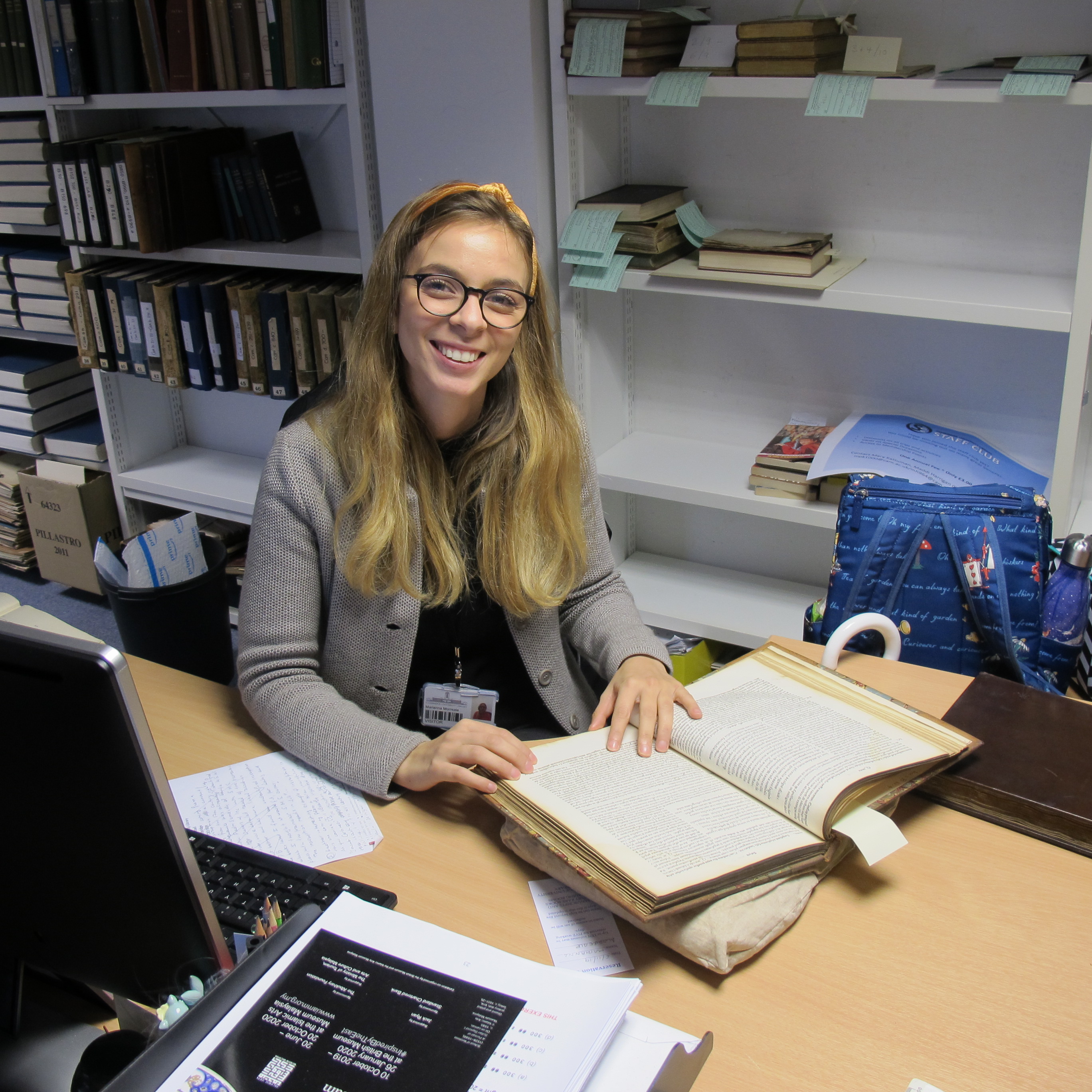 1) To catalogue the collection of incunabula at the University Library of Cambridge to Marianna Morreale, with a degree in Archival and Library Studies from the University of Rome, Italy, a Master in Museology and Cultural Heritage Management from the Catholic University of Milan, and internship experience (“Torno subito” from Regione Lazio) working on the digital provenance archive at the Marciana National Library, Venice.
1) To catalogue the collection of incunabula at the University Library of Cambridge to Marianna Morreale, with a degree in Archival and Library Studies from the University of Rome, Italy, a Master in Museology and Cultural Heritage Management from the Catholic University of Milan, and internship experience (“Torno subito” from Regione Lazio) working on the digital provenance archive at the Marciana National Library, Venice.
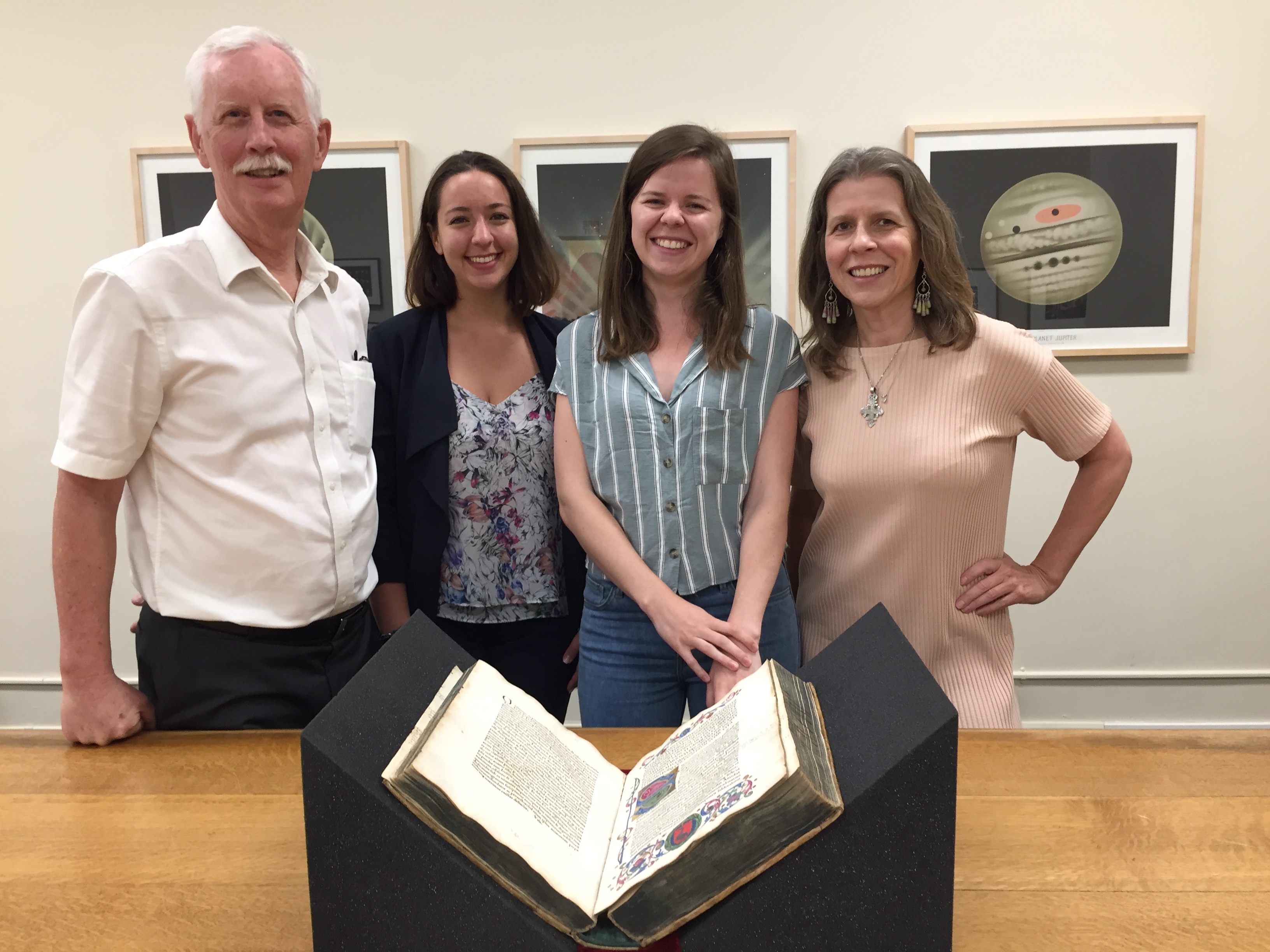 2-3) To catalogue the collection of incunabula at the Huntington Library, San Marino to Martyna Grzesiak, a DPhil Student in Italian and Book History at the University of Oxford who is working on the distribution and use of the Bibles printed in Italian in the fifteenth century, and to Maria José Rucio Zamorano, Head of the Manuscripts and Incunabula Department of the National Library of Spain, Madrid, with expertise in Iberian incunabula. As Ms Rucio Zamorano was unable to go to the US, the grant was offered to Elena Fogolin, a graduate of the University of Udine with an Erasmus + at the Gutenberg Museum of Mainz.
2-3) To catalogue the collection of incunabula at the Huntington Library, San Marino to Martyna Grzesiak, a DPhil Student in Italian and Book History at the University of Oxford who is working on the distribution and use of the Bibles printed in Italian in the fifteenth century, and to Maria José Rucio Zamorano, Head of the Manuscripts and Incunabula Department of the National Library of Spain, Madrid, with expertise in Iberian incunabula. As Ms Rucio Zamorano was unable to go to the US, the grant was offered to Elena Fogolin, a graduate of the University of Udine with an Erasmus + at the Gutenberg Museum of Mainz.
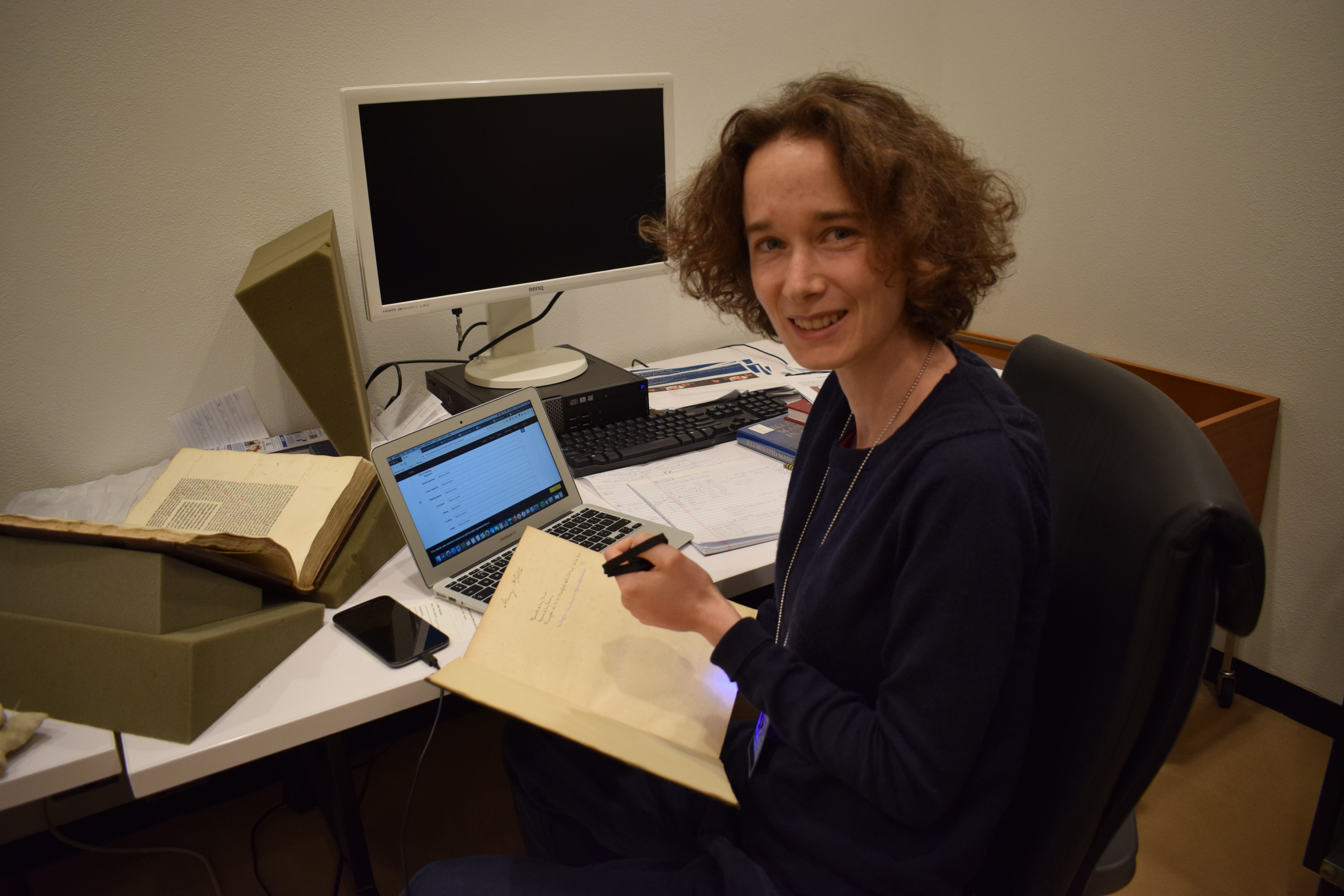 4) To catalogue the collection of incunabula at the Beinecke Library, Yale, to Niamh Delaney, Assistant Librarian in the Special Collections Department of the University of Liverpool, with degrees from the University of Glasgow and St Andrews and a Master in Library and Information Studies from University College, London.
4) To catalogue the collection of incunabula at the Beinecke Library, Yale, to Niamh Delaney, Assistant Librarian in the Special Collections Department of the University of Liverpool, with degrees from the University of Glasgow and St Andrews and a Master in Library and Information Studies from University College, London.
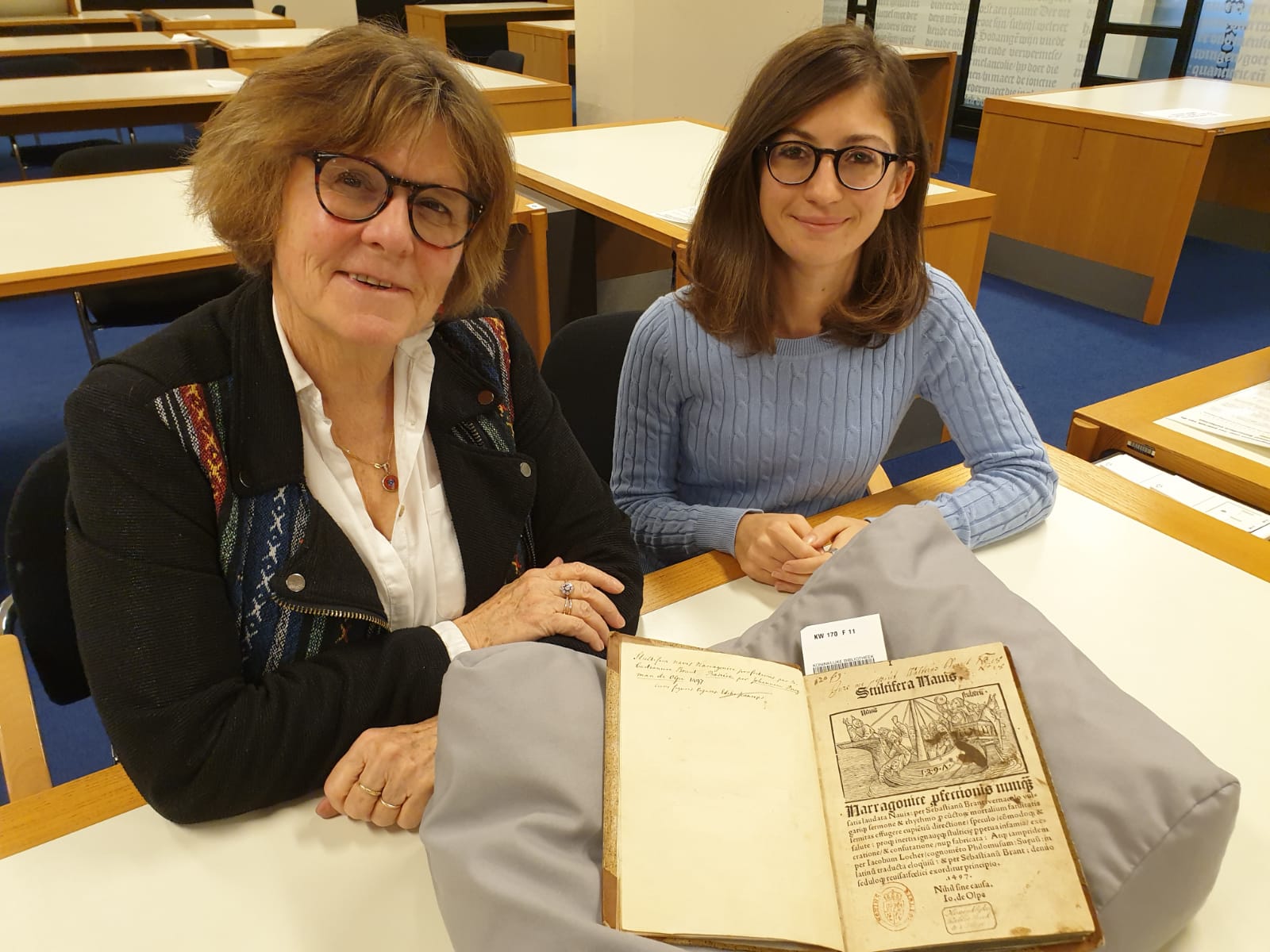 5) To work on CERL’s PDA in The Hague (Digital Humanities Grant) to Fabiano Cataldo de Azevedo, Professor of the Universidade Federal do Estado do Rio de Janeiro (UNIRIO), where is part of the School of Librarianship and teaches History of the Book and Libraries. A member of IFLA's Rare Books and Special Collection Section, initially as a Corresponding Member (2014-2015) and later as a member of the Standing Committee (2015-2019). As Prof. Cataldo was unable to go to The Hague the grant was offered to Lucrezia Signorello, a graduate of Rome La Sapienza University with working experience at ICCU and other Rome libraries.
In 2020 Lucrezia won a PhD position at the University of Rome “La Sapienza”
to work on a project about the reconstruction of the library of the Augustinian convent of Santa Maria del Popolo (Rome) in the 16th century. Supervisor Valentina Sestini, co-supervisor Paolo Tinti.
5) To work on CERL’s PDA in The Hague (Digital Humanities Grant) to Fabiano Cataldo de Azevedo, Professor of the Universidade Federal do Estado do Rio de Janeiro (UNIRIO), where is part of the School of Librarianship and teaches History of the Book and Libraries. A member of IFLA's Rare Books and Special Collection Section, initially as a Corresponding Member (2014-2015) and later as a member of the Standing Committee (2015-2019). As Prof. Cataldo was unable to go to The Hague the grant was offered to Lucrezia Signorello, a graduate of Rome La Sapienza University with working experience at ICCU and other Rome libraries.
In 2020 Lucrezia won a PhD position at the University of Rome “La Sapienza”
to work on a project about the reconstruction of the library of the Augustinian convent of Santa Maria del Popolo (Rome) in the 16th century. Supervisor Valentina Sestini, co-supervisor Paolo Tinti.
The Huntington and Cambridge offered matching funds to secure longer internships.
The Beinecke offered a full grant and also invited last year’s grantees, Beatrice Alai and James Missons, to spend another period working with their incunabula collections.
We received 27 applications from Brazil (1), Hungary (2), Lithuania (2), Italy (15), Spain (2), UK (4), Poland (1). 4 Male and 23 female. 8 librarians or library trainees, 19 early career scholars or students.
RECIPIENTS OF 2017/18 GRANTS
25 February 2018: The CERL Grant Committee is very pleased to announce the conferment of four CERL Grants:
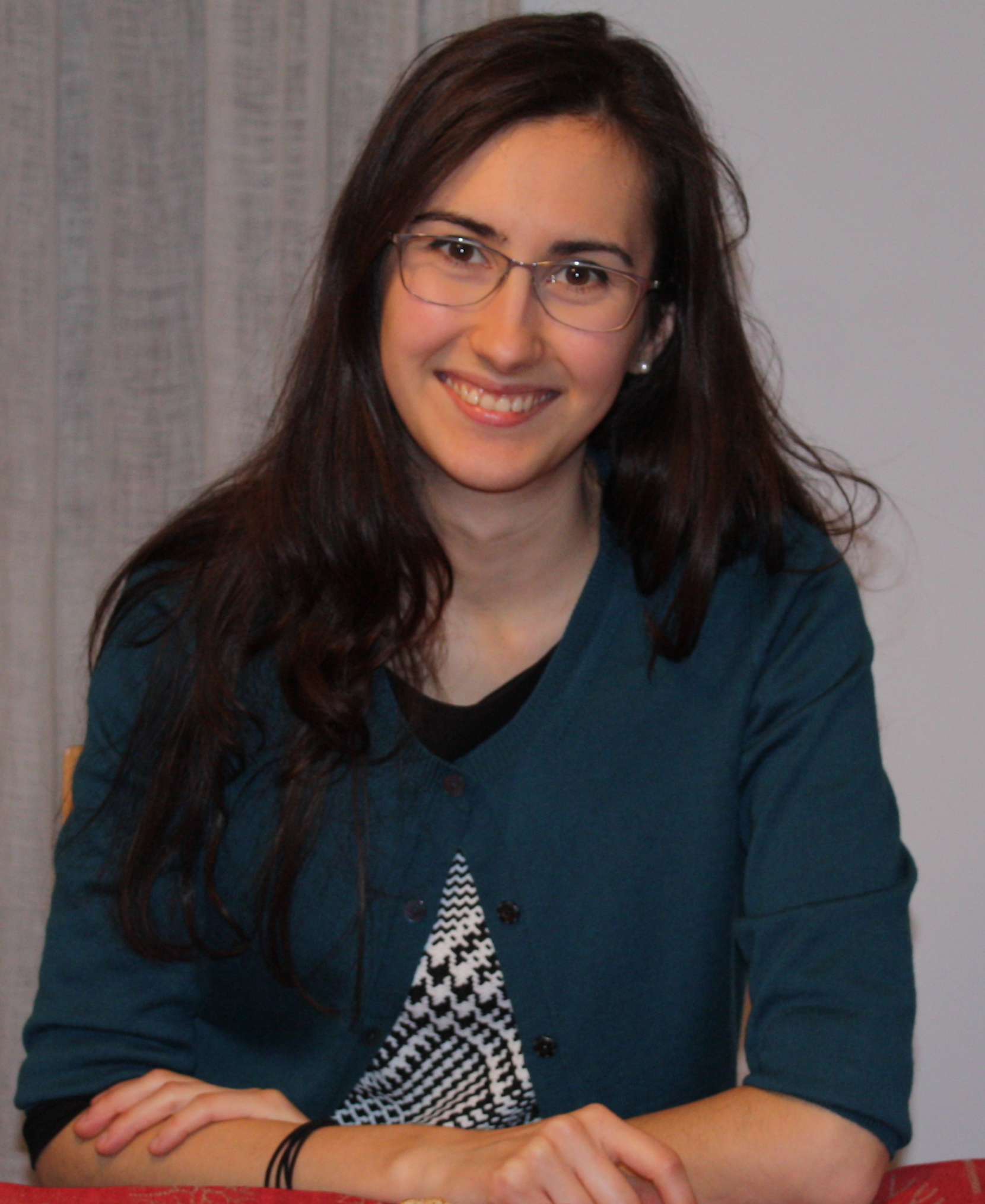 1) To catalogue the collection of incunabula at Cambridge University Library to Ester Peric, a Master student in Italian Philology and Book History from the University of Udine, Italy, with experience in archival documents and an Erasmus + in Manchester spent cataloguing incunabula at the John Rylands University Library. Peric gained a place in the four-year Doctorate programme 'Testi, Tradizioni e Culture del Libro. Studi italiani e romanzi' at the University of Naples (coord. Prof. Andrea Mazzucchi), starting Nov. 2019.
1) To catalogue the collection of incunabula at Cambridge University Library to Ester Peric, a Master student in Italian Philology and Book History from the University of Udine, Italy, with experience in archival documents and an Erasmus + in Manchester spent cataloguing incunabula at the John Rylands University Library. Peric gained a place in the four-year Doctorate programme 'Testi, Tradizioni e Culture del Libro. Studi italiani e romanzi' at the University of Naples (coord. Prof. Andrea Mazzucchi), starting Nov. 2019.
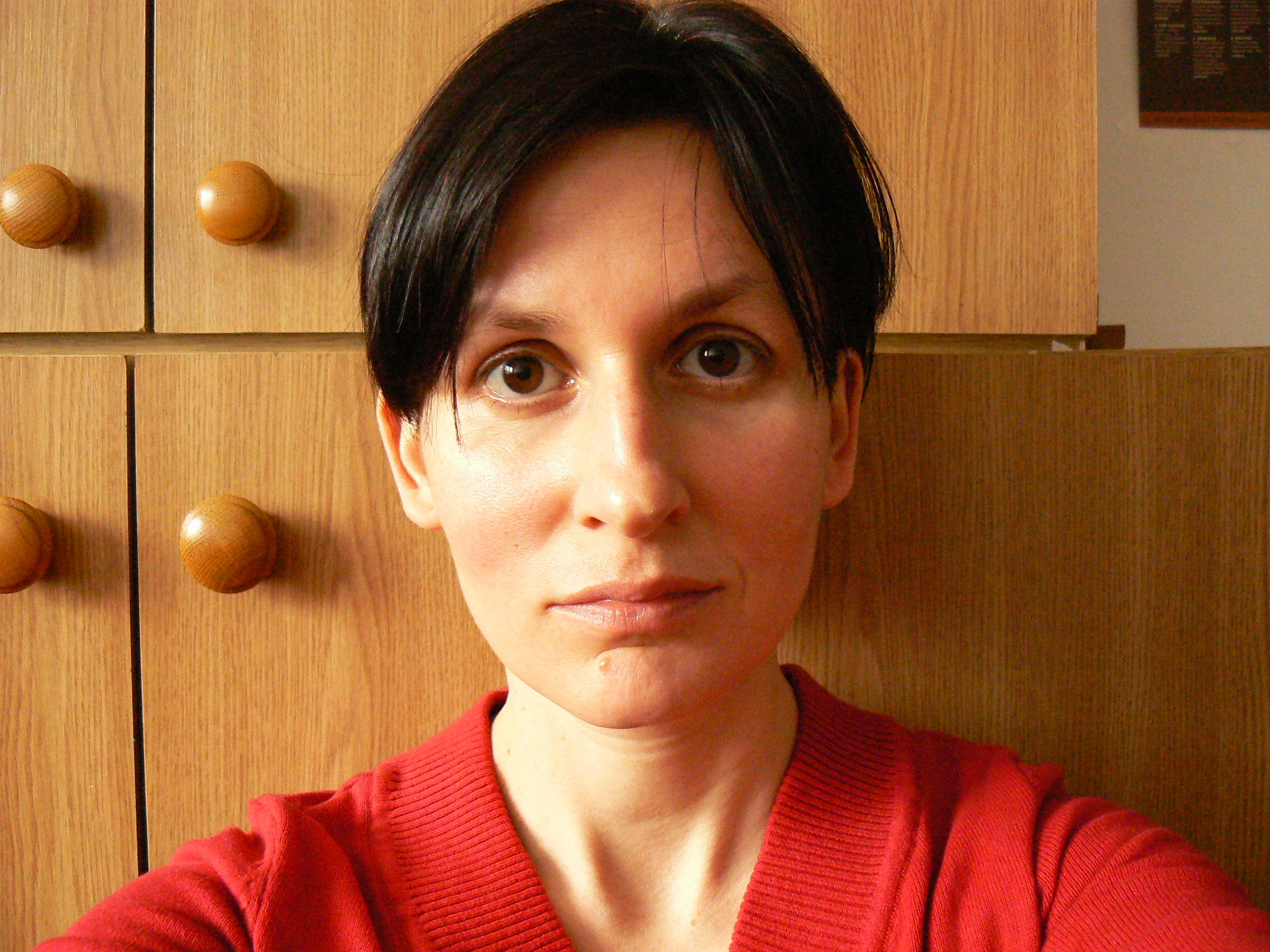 2) To catalogue the collection of incunabula at Edinburgh National Library to Krisztina Rábai, Assistant Professor in Medieval and Book History at the University of Szeged, Hungary, with experience in monastic library collections.
2) To catalogue the collection of incunabula at Edinburgh National Library to Krisztina Rábai, Assistant Professor in Medieval and Book History at the University of Szeged, Hungary, with experience in monastic library collections.
3) To catalogue the collection of incunabula at the Beinecke Library in Yale  to Beatrice Alai, from Cesena, Italy, with degrees in History of Art and Palaeography from the University of Florence and Padua and currently on a postdoctoral fellowship in Berlin to work on the incunabula collection of the Kupferstichkabinett in Berlin.
to Beatrice Alai, from Cesena, Italy, with degrees in History of Art and Palaeography from the University of Florence and Padua and currently on a postdoctoral fellowship in Berlin to work on the incunabula collection of the Kupferstichkabinett in Berlin.
 4) To James Misson, a DPhil student in English Literature from the University of Oxford, with experience in English Palaeography and in cataloguing in MEI incunabula from Oxford colleges.
4) To James Misson, a DPhil student in English Literature from the University of Oxford, with experience in English Palaeography and in cataloguing in MEI incunabula from Oxford colleges.
The three hosting libraries offered matching funds to secure a longer internship. A report of their activities is available here.
25 applications were received from Australia (1), Austria (1), Canada (1), Hungary (1), Italy (12, 4 of which living abroad), Japan (1), Spain (1), Netherlands (3), New Zeland (1), UK (1), US (1), Poland (1).
8 Male and 17 female. 11 librarians or library trainees or students, 14 early career scholars.
RECIPIENTS OF 2016/17 GRANTS
1 May 2017, three Interns started work on enriching MEI entries for the incunables held at the Koninklijke Bibliotheek, the National Library of the Netherlands, in The Hague:
- Ruben Celani (Italy)
- Judit Kolumban (Romania)
- Maria O'Shea (Ireland)
The KB was able to offer a Gerard van Thienen Grant to Lauren Leenders (the Netherlands), to strengthen the team. The team was supervised by Dr Marieke van Delft, Curator Early Printed Collections, KB The Hague.
A report of their activities is available here.
RECIPIENTS OF 2015 GRANTS
CERL received 21 applications.
A grant was awarded to Francesca Rocchi, a graduate in Latin Palaeography of La Sapienza University, Rome, with previous internship experience at the Biblioteca Casanatense in Rome, to work within the Special Collections Department of the Bodleian Library, Oxford. A report of her activities is available here.
A grant was awarded to Thomas Theyssens, a graduate in Early Modern History from the University of Louvain, with a Master in Heritage Management in Libraries from the University of Antwerp, to work within the Printed Heritage Collections Department of the British Library, London. A report of his activities is available here.
More information about the 2015 awards is available here.
RECIPIENT OF 2014 GRANT
2014 - Angéline Rais - Cataloguing the incunabula collection of Lambeth Palace Library, London in the Material Evidence in Incunabula (MEI) database.
Article
Image from: Model Governance

